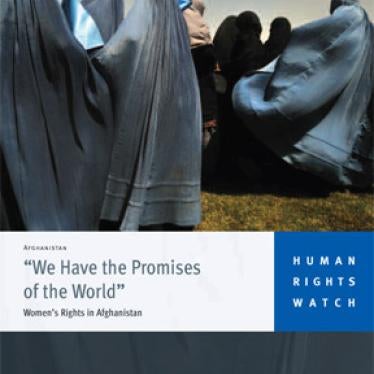(London) - The Afghan government and its supporters should make human rights an integral part of the discussion of political and security strategies at the upcoming conference in London, on January 28, 2010, Human Rights Watch said today.
Specific commitments are needed to protect women's rights, end warlordism, hold human rights abusers accountable, and ensure freedom of expression, Human Rights Watch said.
"Justice and human rights are not optional extras," said Brad Adams, Asia director at Human Rights Watch. "To make progress in Afghanistan, the London Conference should not just focus on military plans in the south and east, but on producing implementable national strategies that tackle impunity and warlordism."
The new focus on governance and justice reform by the government of Afghanistan and its supporters is important, but it cannot succeed as long as current and former warlords and government officials continue to act as though they are above the law, Human Rights Watch said. Government bodies such as the Special Advisory Board on Senior Appointments, Anti-Corruption Tribunal, Major Crimes Task Force, and High Office of Oversight have the potential to increase Afghans' confidence in government.
But the administration of President Hamid Karzai and its international backers need to ensure that these bodies subject all public officials to Afghan law, that those who break the law are appropriately removed or prosecuted, and that these bodies are free from political interference, Human Rights Watch said.
The insecurity Afghans face comes not only from the insurgency, but also from abuses by so-far untouchable government officials and warlords, Human Rights Watch said. Any security strategy should include rooting out abusive and corrupt officials to show Afghans that their government and its international backers can respond to their demands for better governance.
Human Rights Watch called on the international participants at the London Conference to make commitments to review all of their political and military relationships in Afghanistan to ensure that they are not providing financial or political support to individuals or groups known to be engaged in criminal activity or having a record of human rights abuse. This includes ending contracts with private security contractors and unregistered armed groups with ties to criminal networks; and distancing diplomatic and military personnel from individuals or groups against whom credible allegations of human rights abuses have been made.
"President Karzai needs to break his dependence on former warlords and act against officials who abuse local populations, flout the law, and fill their pockets with public funds," Adams said. "Influential governments should lead by example, severing their own links with corrupt or criminal actors."
While women's rights have improved in many areas since the fall of the Taliban government in 2001, recent trends have put these gains under pressure. Attacks on women in public life are increasing, while the passing of the Shia Personal Status Law in March 2009 showed how easily women's rights could be traded away for political gain. Human Rights Watch documented these negative trends in its December report, "We Have the Promises of the World: Women's Rights in Afghanistan."
Human Rights Watch expressed concern about the recent enthusiasm for making deals with the Taliban, saying that unless the focus on political reintegration with Taliban also incorporated effective mechanisms for the protecting Afghan women, the hard-won gains for women's rights would be in jeopardy.
"The rights of women and girls should not be seen as something that can be traded away so that the international community can find an exit strategy for Afghanistan," Adams said. "A return to the subjugation of women and girls cannot be the legacy of international intervention."
Human Rights Watch said the new emphasis on "civilian protection" by the US and NATO forces in Afghanistan should result in fewer civilian casualties. More than 2,400 civilians were reportedly killed in 2009, two-thirds by insurgents and one quarter as the result of actions by US, NATO, and Afghan government forces. However, the arrival of large numbers of additional US and NATO troops this year and continued military operations against the Taliban and other insurgents could result in an increase in civilian deaths in 2010.
US and NATO forces have increasingly recognized the need to provide funds to families for deaths, injuries, and property damage, but individual nations that contribute troops to the NATO led force have still failed to create common practices for "condolence payments," making the process haphazard for Afghan civilians who have suffered loss.
More broadly, the US and NATO have a poor track record in holding their forces accountable for attacks in violation of the laws of war that cause civilian deaths and injuries. This lack of accountability, along with the large numbers of civilian casualties, continues to undermine trust in the government and the international security presence, Human Rights Watch said.
"Afghan civilians have too often been caught up in the fighting between foreign forces and insurgents," Adams said. "If the troop surge causes an increase in civilian casualties it will further undermine the loyalty of the Afghan people."







